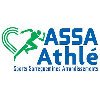Assistant Judge - Races
ARBITRAGE ATHLETISME - Module
How do I follow this module? (27s)
Discover our specific module assistant judge - races.
Don't hesitate to practice with our quizzes.
Video - The officials

The Commissioners
Which of the following actions will be considered obstruction?
Helping another athlete to get up
Pushing an athlete
Passing an athlete on the left (while staying on the track)
It will be considered a fault if:
An athlete walks on the inner line of the lane in a curve without obstructing other athletes
An athlete walks on the outer line of the lane in a curve without obstructing other athletes
In both cases
The wind speed is measured for races up to:
100m included
200m included
400m included
When a race official observes a fault:
He raises a red flag
He disqualifies the athlete in question
He raises a yellow flag
Which of the following functions is not part of the duties of the race official?
Monitoring the baton exchange zone
Giving the start signal
Monitoring for collisions
The Commissioners

The Hurdles
It is allowed to clear the water barrier by landing next to the pit.
True
False
In a 3000m steeplechase, to clear a barrier an athlete cannot:
Placing the foot on the barrier
Placing a hand on the barrier
Passing a foot beside the barrier
In 100m hurdles, an athlete falls and rolls on the ground passing under the next hurdle and then continues the race.
It is valid, the athlete did not obstruct anyone.
It is tolerated, he lost enough time by falling.
He must be disqualified.
In 110m hurdles, it is allowed to knock down a hurdle with the hands.
True
False
The Hurdles

The Relays
Athletes can take marks using:
Shoes
Adhesive tape
They are not allowed to brand
In 4x100m relay, the exchange zone measures:
20m
30m
40m
It is forbidden to throw the baton (between the giver and the receiver).
False
True
If the baton drops, the team is automatically disqualified
True
False
Relay exchanges are done:
By exchanging a baton
By slapping hands
By pushing each other
The Relays
Video - The lap counter

Lap Counter
The board indicates:
The number of laps already completed
The number of laps remaining
The board display is updated by referring to:
To the athlete leading the race
To the peloton
To the last athlete in the race
The bell serves to indicate:
The finish line
The beginning of the final lap
The end of the first lap
Lap Counter
Video - The finish judge

The Finish Judge
From what distance is it essential to take an intermediate split?
1500m
3000m
5000m
For a 400m race, the finish judges are positioned:
On a ladder extension of the finish line
On the track, just after the finish line
In the electronic timing tower
The finish judges' mission is:
To time the athletes
To determine the finishing order
To give the start signal
The Finish Judge

Manual Timer
When an athlete has 3 times available, which one is taken into account?
The one in the middle
The best time
The average of the 3 times
The stopwatch is stopped by relying on:
At the feet of the athlete
At the torso of the athlete
At the head of the athlete
Final times are rounded:
To the nearest hundredth of a second
To the nearest tenth of a second above
To the nearest tenth of a second below
The stopwatch is started by:
When the starter raises the arm
When the pistol flame is seen
When the pistol shot is heard
In the team, each timekeeper is assigned:
One or more lanes (Judge A = lane 1 and 2)
One or more athletes corresponding to the finishing order (Judge A = 1st and 2nd in the race)
It depends on whether the race is more or less than 100m














